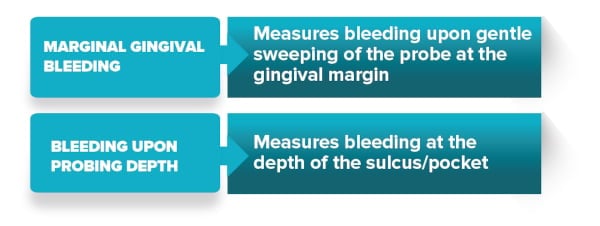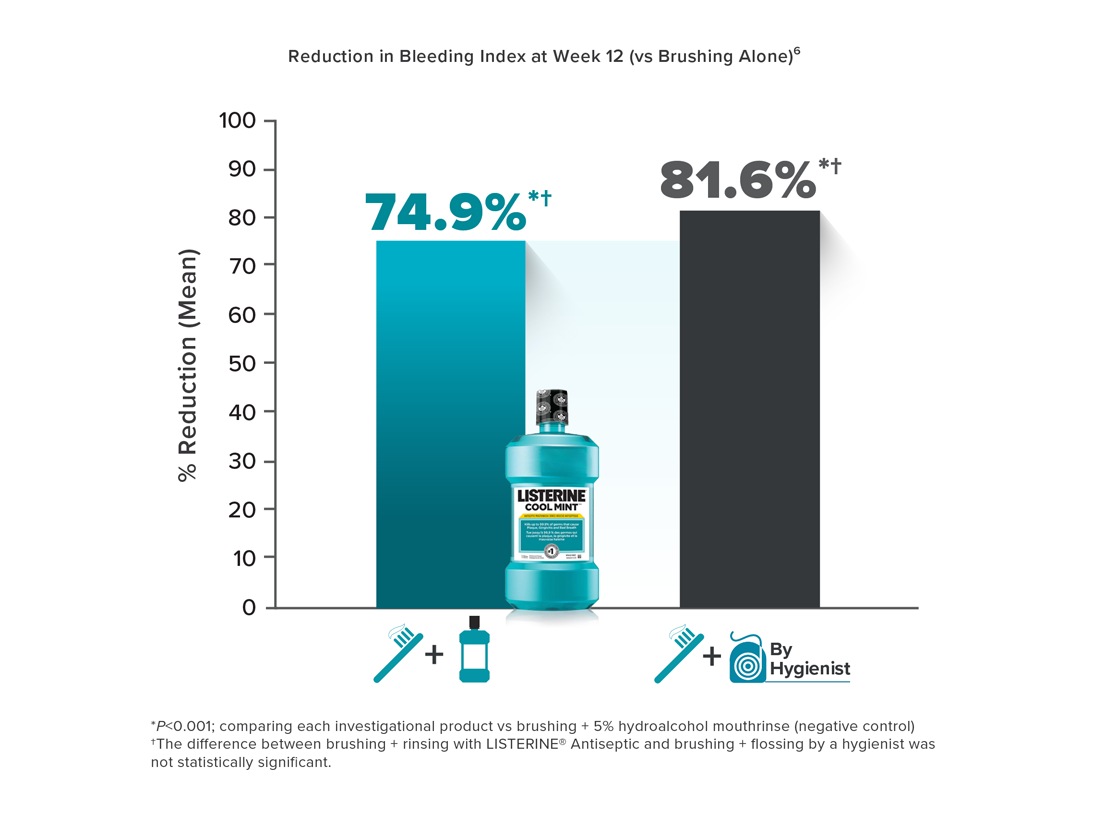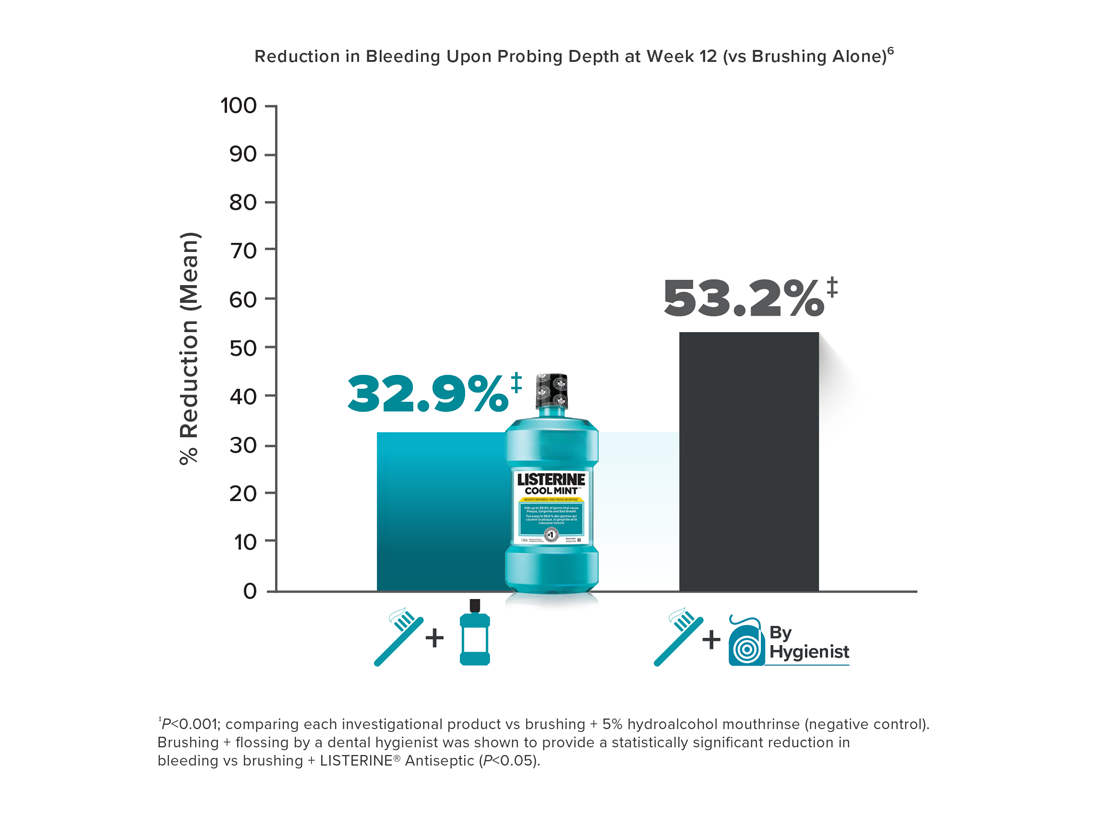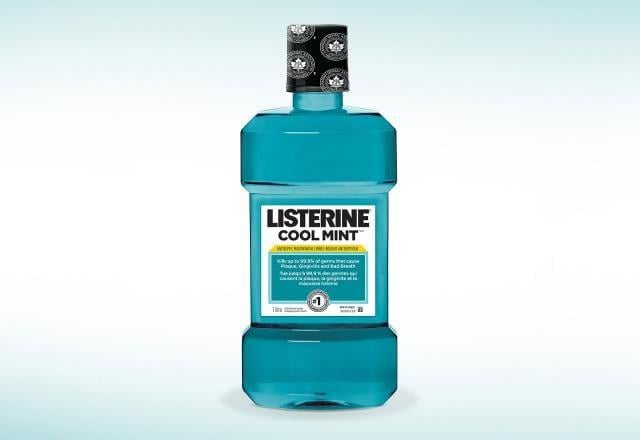FLOSSING CAN MAKE A DIFFERENCE IN A PATIENT’S GINGIVAL HEALTH
The Canadian Dental Association (CDA) recommends cleaning between your teeth with interdental cleaning devices, including floss, as an oral hygiene practice that provides important benefits.1 Flossing, when performed correctly, helps remove plaque from the tooth surface, removes impacted food between teeth, and reaches below the gumline.2
Flossing provides a way to help patients fight plaque buildup and helps reduce the risk of both gum disease and tooth decay. When used alongside brushing and rinsing, flossing provides added oral health benefits.3
Bleeding is an indication of gingivitis4 or even periodontitis.5 There are two types of bleeding measurements that are important in evaluating oral health status:

A recently published 12-week, randomized clinical study compared patients who brushed twice daily and had their teeth flossed by a dental hygienist once daily with patients who brushed and used LISTERINE® Antiseptic twice daily. This study demonstrated that both regimens reduced interproximal bleeding sites by over 70% compared with brushing alone. On average, brushing plus flossing by a dental hygienist reduced interproximal bleeding sites by 81.6% compared with brushing alone, and brushing plus LISTERINE® Antiseptic reduced interproximal bleeding sites by 74.9% compared with brushing alone.6
listerine_chart_07.png

Regarding bleeding upon probing depth, patients who brushed and had their teeth flossed by a dental hygienist experienced fewer interproximal bleeding sites than those who brushed and used LISTERINE® Antiseptic. Among those who brushed and had their teeth flossed by a dental hygienist, interproximal bleeding sites were reduced by 53.2%, compared to brushing alone, and in those who brushed and used LISTERINE® Antiseptic, interproximal bleeding sites were reduced by 32.9%, compared to brushing alone.6
listerine_chart_08.png

AN INTEGRAL PART
OF A COMPLETE DAILY ROUTINE
Effective flossing reaches below the gumline and removes embedded food particles and plaque biofilm between the teeth, helping to improve the health of patients' gums.1-3
However, the benefits of adding an antiseptic mouth rinse should not be overlooked, as rinsing adds significant benefits to oral health.5 LISTERINE® Antiseptic mouth rinse uses an antimicrobial mechanism of action to help prevent plaque buildup above the gumline with continuous use.
Together, brushing, flossing, and rinsing with LISTERINE® Antiseptic on a daily basis provide a comprehensive approach to oral care at home.
References: 1. Home oral care. CDA website, https://www.cda-adc.ca/en/oral_health/cfyt/dental_care/flossing_brushing... Updated July 22, 2020. Accessed January 9, 2023. 2. Kerr WJS, Kelly J, Geddes DAM. The areas of various surfaces in the human mouth from nine years to adulthood. J Dent Res. 1991;70:1528-1530. 3. Floss/interdental cleaners. CDA website. https://www.cda-adc.ca/en/oral_health/cfyt/dental_care/flossing_brushing... September 21, 2021. Accessed January 9, 2023. 4. Van der Weijden GA, Timmerman MF, Nijboer A, Reijerse E, Van der Velden U. Comparison of different approaches to assess bleeding on probing as indicators of gingivitis. J Clin Periodontol. 1994;21:589-594. 5. Chapple ILC, Van der Weijden F, Doerfer C, et al. Primary prevention of periodontitis: managing gingivitis. J Clin Periodontol. 2015;42(suppl 16):S71-S76. 6. Bosma ML, McGuire JA, Sunkara A, Sullivan P, Yoder A, Milleman J, Milleman K. Efficacy of Flossing and Mouthrinsing Regimens on Plaque and Gingivitis: A randomized clinical trial. J Dent Hyg. June 2022; 96(3), 8-20.
CLINICAL STUDY
Explore the findings of a 12-week study comparing the efficacy of LISTERINE® Antiseptic, flossing, and other oral hygiene measures on multiple oral health metrics
THE SCIENCE BEHIND LISTERINE® ANTISEPTIC
Discover the mechanism of action behind the effective antimicrobial clean of LISTERINE® Antiseptic




